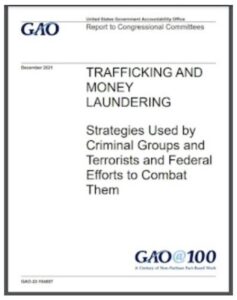Cultural Property Lawyers Must Remain Alert to Antiquities Trafficking and Money Laundering

A new GAO report finds that criminals and terrorists may attempt to use lawyers to launder money. Cultural property attorneys should be vigilant.
A congressional watchdog charges that some arts and antiquities dealers, accountants, and “complicit lawyers” help fuel “money laundering strategies used by transnational criminal organizations and terrorist groups.”
The Government Accountability Office’s (GAO) new report, titled TRAFFICKING AND MONEY LAUNDERING: Strategies Used by Criminal Groups and Terrorists and Federal Efforts to Combat Them, serves as a reminder that criminal networks may rely on lawyers to facilitate crimes like antiquities trafficking.
“The high-value art market is attractive to money launderers for reasons including a lack of transparency in transactions and anonymity among buyers and sellers,” the GAO finds, “partly because dealers act as intermediaries who facilitate transactions.”
Because lawyers also could act as facilitators, they must guard against abetting criminal conduct such as purchasing and reselling art and antiquities, where lawyers might “use their knowledge and abilities to help launder criminal proceeds.”
Attorneys should be mindful of aiding other crimes too, such as creating shell companies to traffic cultural property or to conceal payments. According to the GAO report, the U.S. Treasury Department says that attorneys “may be complicit or willfully blind when creating shell companies for criminals to use to launder their illicit proceeds.”
Mislabeling customs entry forms to help skirt import restrictions placed on at-risk archaeological and ethnological material, securing improper tax benefits through charitable donation schemes that involve looted artifacts, and washing dirty antiquities money through client trust accounts illustrate other possible forms of complicity.
In 2020, the American Bar Association warned attorneys about participating in client wrongdoing, putting bar members on notice that willful blindness is no excuse. “A lawyer may … face criminal charges or civil liability, in addition to bar discipline, for deliberately or consciously avoiding knowledge that a client is or may be using the lawyer’s services to further a crime or fraud,” admonished the ABA Standing Committee on Ethics and Professional Responsibility.
The GAO published its latest report after FinCen (Financial Crimes Enforcement Network) “identified trafficking activity of transnational criminal organizations and terrorist groups as among the most significant illicit finance threats facing the United States.” The agency’s conclusion came on the heels of an Advisory issued by the Office of Foreign Assets Control in October 2020 that called on high-end art market participants to comply with U.S. sanctions regulations.
Last year, Congress adopted the Anti-Money Laundering Act and the Corporate Transparency Act to stem illicit financial flows. Lawmakers placed antiquities dealers were placed under the Bank Secrecy Act’s reporting obligations as part of a broader legislative package that addressed defense and national security matters.
____________________
Text and original photos copyrighted 2010-2022 by Cultural Heritage Lawyer Rick St. Hilaire, a blog commenting on matters of cultural property law, art law, art crime, cultural heritage policy, antiquities trafficking, looted, antiquities, stolen relics, smuggled antiquities, illicit antiquities, museum risk management, and archaeology. Any unauthorized reproduction or retransmission without the express written consent of CHL is strictly prohibited. The materials presented on this site are for informational purposes only and do not constitute legal advice. Retain a lawyer to receive legal help. The provision of this information to the reader, moreover, in no way constitutes an attorney-client relationship. Blog url: culturalheritagelawyer.blogspot.com.

